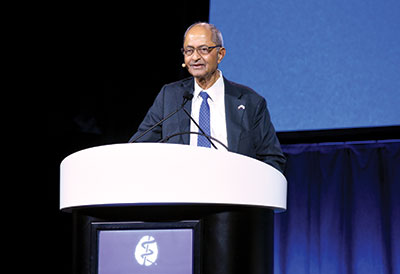Viswanathan Introduces Theme of Lifestyle Psychiatry
Abstract
Viswanathan said he will work with APA components to develop a curriculum on lifestyle medicine and psychiatry, to disseminate knowledge about it, and to promote research in this area.
Advising about healthy habits and lifestyle is a way psychiatrists can immediately help patients improve physical and mental health. So, when incoming APA President Ramaswamy Viswanathan, M.D., Dr.Med.Sc., cast about for a theme for his presidential year, he landed on “Lifestyle for Positive Physical and Mental Health.”

APA’s new president said neuroimaging has demonstrated the effect on the brain of exercise among patients with serious mental illness.
“I have chosen this theme because the data show us that when an effort is made to live a healthier lifestyle, outcomes for physical and mental health, and life expectancy all improve,” he said at the Opening Session of APA’s 2024 Annual Meeting. “Many avoidable health conditions and premature deaths can be attributed to an unhealthy lifestyle.
“Lifestyle interventions should be offered in addition to psychotherapy, pharmacotherapy, other somatic therapy, and attention to social determinants of health, not only to ameliorate or cure illnesses, but to help people lead positive, meaningful lives.”
Viswanathan noted the six pillars of lifestyle medicine: regular exercise, a plant-based diet with minimal or no processed foods, restorative sleep, stress reduction, avoidance of harmful substances, and positive social connectedness. He said 80% of health care spending in this country is for the treatment of conditions attributable to unhealthy lifestyle choices.
“There is considerable evidence for the effectiveness of lifestyle interventions in both physical and mental health,” he continued. “Neuroimaging shows an increase in hippocampal brain volume after 12 weeks of moderate intensity aerobic exercise in patients with schizophrenia and normal controls, and this is accompanied by a reduction in negative symptoms and improved cognitive functioning. Patients with moderate depression improve as much when treated with an exercise program as when treated with an SSRI, both partly acting by stimulating release of brain-derived neurotrophic factor that promotes hippocampal growth.”
Viswanathan said he will work with the APA Caucus on Lifestyle Psychiatry and other components to develop a curriculum on lifestyle medicine and psychiatry for trainees and APA members, disseminate this knowledge, and encourage practitioners and health care systems to implement lifestyle interventions and promote research in this area. He also plans to work with the APA Foundation to incorporate promotion of a healthy lifestyle into the Foundation’s current activities and programs, such as the Mental Health Care Works campaign.
Viswanathan recounted his journey as an immigrant, beginning with the loss of his father as a toddler in India. “When I was 2 years old, my father died of a heart attack at the age of 42,” he said. “My mother, who had not finished high school and was not working, was left to care for five young children, of whom I was the youngest.
“To this day, a painful aspect of my life is that I have no memory of my father. In Indian society in those days, if you were without a father, your social standing was demoted. However, I was blessed by the mentoring of many family members, teachers, and even strangers who showed kindness and a special interest in me. … My experience in my personal and professional life has been shaped by those around me, my family and my friends, my colleagues, and professional peers.”
The relationships he has formed through membership in APA have been decisive, he said. “I learned and grew a lot in my years of service in the APA Assembly and components, absorbing knowledge and skills from critically thinking psychiatrists with diverse experiences,” Viswanathan said. “I worked with them to develop some key ideas and action papers. I grasped how to break the glass ceiling by observing women and minority leaders.”
Viswanathan noted that he was the first person of color to be elected president of the Brooklyn Psychiatric Society and is now the first person from Brooklyn to be elected president of APA. “In this moment, I remember my mother. Her only goal in life was that all the children finish high school. How nice it would be if she were alive today to see the position her son has risen to. ... This country has given me and countless other immigrants immense opportunities.” ■



